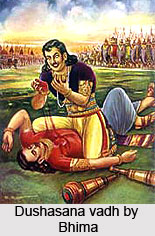 Bhima is the second son of Pandu and Kunti. The term Bhima means `terrible`. But mystically, Bhima is said to be begotten by Vayu, the god of the wind or air through his mother Kunti or Pritha.
Bhima is the second son of Pandu and Kunti. The term Bhima means `terrible`. But mystically, Bhima is said to be begotten by Vayu, the god of the wind or air through his mother Kunti or Pritha.
Bhima is the main General of the Pandava army in the Kurukshetra war. Bhima is renowned for his strength and swiftness. Duryadhana, his cousin tried to take his life by poisoning when Bhima was a youth but he escaped with the help of the Nagas. Bhima was trained fighting with the club by Dronacharya. It is said that in an exhibition of arms at Hastinapur Bhima fought against Duryadhana with the club.
The wars of Bhima with the Asuras are referred to the old wars between the Aryans and Aborigines. Bhima married Hidimba, the sister of Asura Hidimbo, who was slain by Bhima. This part is said to be a later addition to the original tradition. Bhima slaughtered an Asura called Vaka, Jarasandha and the Raja of Magadha and his sons.
Hanuman is said to be the mythical brother of Bhima. Bhima killed Jimuta in a battle. Bhima was appointed as the chief cook which was his provision to eat all the huge amount of food himself. Bhima killed the Prime Minister Kichaka due to his ill-treatment of Draupadi. Bhima rescued Raja Virata from Susarman who was carrying him into captivity. Bhima also fought with Bhishma in the first day of the great war of Kurukshetra.
Bhima is also the Raja of Vidarbha (Berar) and father of Damayanti.
Again, Bhima is the fifth of the eight Rudras to whom was assigned the charge of fire.
This article is a stub. You can enrich by adding more information to it. Send your Write Up to content@indianetzone.com












